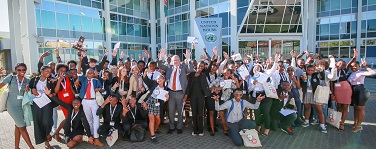
Regional stakeholder workshop on Earth observation technology to take place in Windhoek

The Southern African Science Service Centre for Climate Change and Adaptive Land Management (SASSCAL) will hold a Hybrid (Global Monitoring for Environment and Security) GMES and Africa Regional Workshop from 27 to 29 September at Safari Hotel in Windhoek.
The GMES and Africa Initiative is a programme formed out of mutual cooperation between Africa and Europe with a focus on Earth Observation (EO) systems in collaboration with the Council for Scientific and Industrial Research (CSIR).
Ester Nakanduungile, Communications and Marketing Officer at SASSCAL said the programme was formed to respond to the global need to manage the environment, understand and mitigate the effects of climate change and ensure civil security by providing information to policymakers, scientists, the private sector and the public.
“GMES and Africa aim to promote development of local capacities, institutional, human and technical resources for access to and exploitation of Earth Observation (EO) based services on an operational basis for sustainable development in Africa,” she added.
She said the workshop will provide an opportunity to promote and encourage mutual exchanges in terms of sharing best practices, knowledge and experiences as well as allow for the exchange of information and knowledge on new and innovative Earth Observation technologies developed under the programmes and their alignment with the region’s sustainable development strategies.
“The workshop will also reveal trends in the use of Earth Observation data to monitor and assess wetland conditions, threats to sustainable utilization of wetland resources as well as updating stakeholders on how climate change variability and drought is continually affecting Sub-Saharan Africa’s surface water resources,” she said.
Nakanduungile said the workshops envisage outcomes will be to ensure shared knowledge and understanding of the new and innovative Earth Observation technologies, and their application to society.
SASSCAL is expected a broader pool of international delegates from the two continents, Europe and Africa, both physically and virtually, which include the member countries policymakers, line ministers from the SADC countries, public and private sector stakeholders, implementers, Basin Commissions, researchers and any other stakeholders who activities are related to coastal areas, rivers and their ecosystems.
She further informed that in Southern Africa, SASSCAL led consortia is implementing the Wetland Monitoring and Assessment Service for Transboundary Basins in Southern Africa (WEMAST) Project while CSIR is leading the Marine and Coastal Operations for Southern Africa (MACRO-South).
“In its first phase, GMES has funded 13 consortiums in Africa and SASSCAL Members of the consortium include the University of Botswana, University of Zambia, Cape Peninsula University of Technology, the University of the Western Cape and Midlands State University, South African National Space Agency (SANSA) and the National Remote Sensing Centre (NRSC) of Zambia,” she concluded.













































